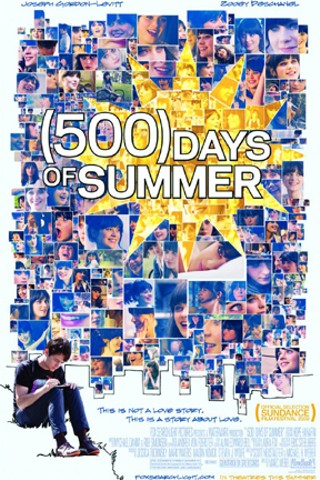Young people are so cute when they fall in love with each other's special crotch feelings. Or at least that's the convention in the movies, where the menace of acne is unknown, and the elderly appear only in the shadows to utter something wise or stupid, and then cede the floor to slender and worthier youths.
(500) Days of Summer has some awareness of these and other conventions of the romantic-comedy genre, and even wants to comment on them and reject them. At the same time, it's just as much of a profit-oriented venture as any other film, so it stars the adorable Zooey Deschanel and Joseph Gordon-Levitt, either of whom could make bank by just staring into the camera for 95 minutes. While the filmmakers refuse to fall for about 20 percent of the clichés of the genre, they wallow around in the other 80 percent like pigs in a simile.
So (500) Days is at least 20 percent better than the average rom-com, and because most rom-coms suck, (500) Days winds up being about 400 percent better than the majority of rom-coms. (Yes, the average rom-com is considerably better than the majority of rom-coms. Ask your math teacher how that's possible.) A big chunk of its success is due to its two main gimmicks. First, the film takes place over 500 days, but the days are not played out in order. It starts on mysterious day 488, when we see Summer Finn (Deschanel) place a jewel-encrusted ring finger over the hand of Tom Hansen (Joseph Gordon-Levitt), indicating, what? That they're engaged? (Also, yes, their names are "Tom" and "Finn," so it's gonna be that kind of movie.)
Then things zoom back through the ups and downs of their relationship, jumping from day two to some days in the 200s, back down to the 30s, into the teens, etc. This works, because as in life, a story is made up of lots of little stories, and these don't play out or get resolved in neat sequences. So we see, somewhere around day 300, Tom turning the taps on a sink in a department-store display, and telling Summer, "Oh no, the sink is broken!" when no water flows out. Summer looks bored and suicidal. Then we zoom back to day 38, when Summer makes the same joke at an Ikea, and Tom gazes at her lovingly and wonders how long it will take to remove his pants.
Fun stuff, seriously. And Levitt and Deschanel are pretty good in the roles. I've seen Levitt do better, but even when he's not at his best, he's better than most. Meanwhile, Deschanel always plays the same character, but I think that's because casting directors look at her huge Kewpie-doll eyes and make her The Magical Girlfriend.
Luckily, that stereotype (the enchanted girl who restores life to the sad or anaesthetized male lead) is something that (500) Days writers Scott Neustadter and Michael Weber are well aware of, and they pretty successfully reject it. It's not that Summer isn't that girl; in a flashback sequence, we see her magical beauty creating tumescence and joy as she floats through her Midwestern hometown. It's just that she's not that girl for Tom, even though he thinks she is.
And that's the crux of the film's departure from the rom-com norm. It's a nice departure, perhaps not as a radical as the filmmakers had hoped, but still, except for a horribly tacked-on ending, the film successfully avoids the inherent happiness of most boy-meets-girl, boy-stalks-girl, boy-fails-to-be-arrested-but-instead-receives-love movies.
The filmmakers have fun with the form. In one of the finest sequences, the morning after Tom finally learns whether or not Summer has a mole on her inner thigh, he walks down the street with a smile as big as the U.S. deficit. Soon, he's being followed by a chorus of happy people, who perform a dance number as the bluebird of happiness alights on his shoulder.
Which is essentially the film's other gimmick: Its willingness to go cartoon. Tom, a frustrated architect working as a greeting-card writer, sketches cityscapes and then walks into the images, which act as interstitials when the scene jumps from day to day. This could be annoying if handled poorly, but director Marc Webb understands that an effect has a meaning, and you should only use it if that meaning is both pertinent and not already well-established by something else.
In fact, Webb knows it so well that he actually has most of the conversations in the film occur without intrusive background music. This is a welcome relief when, in a feat of cinematic precision, he shows the first awkward moment when Tom and Summer don't kiss. They stand outside a bar, their small talk withering, pauses extending, their faces edging a bit closer, but not close enough, and then, nothing. Webb should pat himself on the back for pulling the scene off.
There's also a great scene in which the couple watches The Graduate, and Deschanel gets to do some acting that shows she's got more chops than her pretty-girl roles have previously allowed her to show. She does something weird and complex here that explains the whole film, giving a seemingly out-of-place emotional response that's both mysterious and informative.
So, on the whole, (500) Days of Summer succeeds where most romantic comedies annoy. Unfortunately, it also has the need to please the audience and betrays itself in an unneeded final sequence, but that's true of much of life and art, so I guess it's forgivable. Webb seems to understand this, though, and as the final sequence plays out, a song comes up, the lyrics of which tell us that we expect a happy ending. I'm not sure we do, but at least in this sellout moment, Webb shows that he knows he's selling out.











